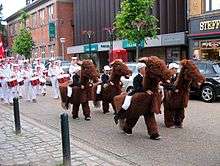Definify.com
Webster 1913 Edition
Parade
Pa-rade′
,Noun.
[F., fr. Sp. ]
parada
a halt or stopping, an assembling for exercise, a place where troops are assembled to exercise, fr. parar
to stop, to prepare. See Pare
, Verb.
T.
1.
The ground where a military display is held, or where troops are drilled. Also called
parade ground
. 2.
(Mil.)
An assembly and orderly arrangement or display of troops, in full equipments, for inspection or evolutions before some superior officer; a review of troops. Parades are general, regimental, or private (troop, battery, or company), according to the force assembled.
In state returned the grand
parade
. Swift.
4.
Hence:
A pompous show; a formal or ostentatious display or exhibition.
Be rich, but of your wealth make no
parade
. Swift.
5.
Posture of defense; guard.
[A Gallicism.]
When they are not in
parade
, and upon their guard. Locke.
6.
A public walk; a promenade.
Dress parade
, Undress parade
Parade rest
, a position of rest for soldiers, in which, however, they are required to be silent and motionless.
Wilhelm.
Syn. – Ostentation; display; show.
–
Parade
, Ostentation
. Parade is a pompous exhibition of things for the purpose of display; ostentation now generally indicates a parade of virtues or other qualities for which one expects to be honored. “It was not in the mere parade of royalty that the Mexican potentates exhibited their power.” Robertson.
“We are dazzled with the splendor of titles, the ostentation of learning, and the noise of victories.” Spectator.
Pa-rade′
,Verb.
T.
[
imp. & p. p.
Paraded
; p. pr. & vb. n.
Parading
.] [Cf. F.
parader
.] 1.
To exhibit in a showy or ostentatious manner; to show off.
Parading
all her sensibility. Byron.
2.
To assemble and form; to marshal; to cause to maneuver or march ceremoniously;
as, to
. parade
troopsPa-rade′
,Verb.
I.
1.
To make an exhibition or spectacle of one’s self, as by walking in a public place.
Webster 1828 Edition
Parade
PARA'DE
,Noun.
1.
In military affairs, the place where troops assemble for exercise, mounting guard or other purpose.2.
Show; ostentation; display. Be rich, but of your wealth make no parade.
3.
Pompous procession. The rites performed, the parson paid,
In state return'd the grand parade.
4.
Military order; array; as warlike parade.5.
State of preparation or defense.6.
The action of parrying a thrust.PARA'DE
,Verb.
T.
1.
To exhibit in a showy or ostentatious manner.PARA'DE
,Verb.
I.
1.
To go about in military procession.2.
To walk about for show.Definition 2026
Parade
parade
parade
English

A band marches in a parade in Denmark.
A parade of Geese
Noun
parade (plural parades)
- An organized procession consisting of a series of consecutive displays, performances, exhibits, etc. displayed by moving down a street past a crowd.
- The floats and horses in the parade were impressive, but the marching bands were really amazing.
- Any succession, series, or display of items.
- The dinner was a parade of courses, each featuring foods more elaborate than the last.
- a parade of shops
- A line of goslings led by one parent and often trailed by the other.
- The ground where a military display is held, or where troops are drilled.
- Pompous show; formal display or exhibition.
- Jonathan Swift
- Be rich, but of your wealth make no parade.
- Jonathan Swift
- (Gallicism) Posture of defense; guard.
- John Locke
- when they are not in parade, and upon their guard
- John Locke
- A public walk; a promenade; now used in street names.
- He was parked on Chester Parade.
- 1914, G. K. Chesterton, "The God of the Gongs", in The Wisdom of Father Brown, p. 216:
- After walking a mile or two farther, they found that the shore was beginning to be formally embanked, so as to form something like a parade; the ugly lamp-posts became less few and far between and more ornamental, though quite equally ugly.
Derived terms
Terms derived from parade
|
|
|
Translations
organized procession
|
|
any succession or series
Verb
parade (third-person singular simple present parades, present participle parading, simple past and past participle paraded)
- (intransitive) To march or to display.
- They paraded around the field, simply to show their discipline.
- (transitive) To display or show; to exhibit in a showy or ostentatious manner; to show off.
- They paraded dozens of fashions past the crowd.
- Parading all her sensibility. Byron.
- (transitive) To march past.
- After the field show, it is customary to parade the stands before exiting the field.